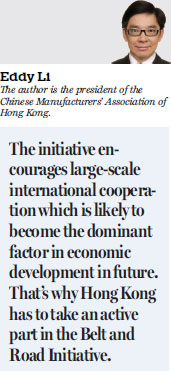Policy Address is going to help HK's Belt and Road participation
Updated: 2017-02-13 07:45
By Eddy Li(HK Edition)
|
|||||||
Chief Executive Leung Chun-ying delivered the last Policy Address in his term of office on January 18. In this report, the longest Policy Address ever, Leung covered almost every aspect of society and the economy. He noted the achievements of the current government and shared his vision for the future development of Hong Kong. On the whole, it was a report of honesty and responsibility.
As a member of the business and industrial sector, I naturally care most about economic development and business opportunities. When responding to the previous Address, I especially appreciated that Hong Kong's government attached great importance to the central government's Belt and Road strategic initiative. The initiative encourages large-scale international cooperation which is likely to become the dominant factor in economic development in future. That's why Hong Kong has to take an active part in the Belt and Road Initiative.
In order to do so, I suggest Hong Kong should act soon to achieve these two goals: The first is to join the Asian Infrastructure Investment Bank (AIIB). Hong Kong is already an international financial center and the world's largest offshore yuan business center; the city can play an active part in infrastructure financing.

The second is to strengthen our role as a center of testing, certification and arbitration, since the Belt and Road Initiative involves many countries and regions with a varied assortment of laws and rules. Hong Kong's professional services can deal with most of the problems that arise during commercial activities.
I am pleased to see from the latest Policy Address that Hong Kong takes both these suggestions seriously. In Paragraph 19, it is clearly written that "Hong Kong has been officially invited to join the AIIB". The relevant procedures are expected to be completed within the first half of this year. Hong Kong can really help the AIIB. This is because a number of aspects of infrastructure construction (including financing, bonds, investment, financial management, foreign exchange control, etc) are areas where Hong Kong has expertise.
In Paragraph 23, "The National 13th Five-Year Plan gives clear support for Hong Kong to establish itself as a center for international legal and dispute resolution services in the Asia Pacific region. The government will continue to create favorable conditions, improve supporting infrastructure and enhance coordination." This will help Hong Kong secure a position as a center of testing and certification and arbitration along the Belt and Road.
Hong Kong's active participation in the "Belt and Road", as discussed by Leung in the address, creates new opportunities for the city's younger generation and will boost the development of the economy and society in coming decades.
The crucial factor in the sustainable development of society and the economy is the availability of talent. Therefore, the government has started to promote educational cooperation and communication to give Hong Kong students a more thorough understanding of countries along the Belt and Road.
The efforts include slight adjustments to the curriculum in elementary and secondary schools, compiling related teaching materials and enhancing opportunities to learn foreign languages. The government will also increase the annual quota of mainland exchange programs along the Silk Road this year to 5,600 students and encourage student exchanges through the Quality Education Fund.
Addressing education at an early stage shows the far-sightedness of Hong Kong. Non-government organizations or individuals are willing to support this sensible move of linking Hong Kong to foreign countries and consolidating our city's role as a super-connector. It is revealed that apart from the Hong Kong Scholarship for Belt and Road students (from Indonesia) started from this school year, similar scholarship schemes for Malaysia and Thailand, both funded by individual donations, will be introduced in the next school year.
The Chinese Manufacturers' Association of Hong Kong has supported this scheme, too. A special fund is dedicated to offer 10 eligible Malaysian students up to HK$120,000 a year to cover tuition fees. An additional bursary of HK$50,000 a year will be provided to financially needy awardees.
(HK Edition 02/13/2017 page8)